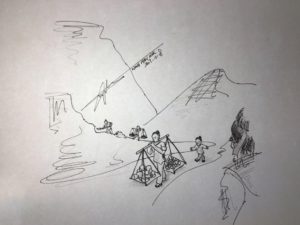Responsible Research in Business and Management (short RRBM) has been a long journey in the making, but it is still in the beginning stages. From the start, we knew that this would be a difficult project. RRBM is like trying to move a big mountain; however, the group of 28 RRBM founders was not afraid. We wanted to try, like that “foolish old man” in the Chinese fable. He wanted to move the mountain separating the village from the green pastures on the other side. The villagers laughed at his naiveté and said that he would not succeed in his lifetime. He replied, “No worry, after I die, my sons will continue. When my sons die, their sons will continue. After that, their sons’ sons will continue. Eventually, we will move the mountain.”

“The foolish old man moving the mountain”
(Appreciation to Mr. Wong Man Nok, PhD student at the Baptist University of Hong Kong for the use of his painting)
We can imagine three types of responses to RRBM among our fellow villagers in our research “village.” One group says that our research is already both credible and useful; we just do not know how to measure impact. A second group agrees that impact is low because we don’t know how to translate our knowledge for practitioners to use. A third group defends academic freedom. We can do whatever we like. This group is likely to feel offended by the word “responsible” because it may imply that all we have done is irresponsible. RRBM founders attempted to find a different word during the two years when we were writing the position paper. We could not find another word to describe what we have discussed in the position paper.
I asked my good colleague and peer past president of the Academy of Management, Paul Adler, about these reactions. He said this, ‘I don’t know that there is any word that overcomes these three types of concerns—with all three of these groups; all we can say is that we see your point, but it doesn’t negate ours.’ Yes, SOME of our research is both credible and useful, and yes, we need to do better in working out how to measure impact. Yes, we do not know how to translate our knowledge for practitioners to use, but too much of it is untranslatable because it is useless—many studies never even tried to be useful. Yes, we must defend the academic freedom to do “whatever we like”—but we (RRBM) are talking about why we should desire things that contribute to societal well-being rather than just advance individual careers or self-indulgent fiddling while Rome burns. The third of these do suggest some nuance to the text. In my humble opinion, we might do well to acknowledge the importance of academic freedom, if only on utilitarian grounds—that we never know ahead of time what direction of fundamental research will end up yielding useful practical value. So no, not every project needs to be able to state a socially useful rationale. On the other hand, if we were to continue the discussion, and if none of your research has any relation to society’s burning issues, we might wonder if you are in the right place working in a business school: if you want to do pure theory, perhaps you belong in the disciplinary departments, rather than a b-school.”
There is a fourth type of resister. They are those who are complacent. Life is good so why bother with the change. I understand these responses. Change is difficult for most of us because the status quo is the comfort zone.
However, there is a reason to be hopeful. Another 85 “foolish men and women” (cosigners of the position paper) have joined the original 28. Many more endorses have picked up their spades or hoes and have joined in chipping at the mountain. We hope many of you will have the courage to participate. Every person can make a difference, and together, we can move the mountain.